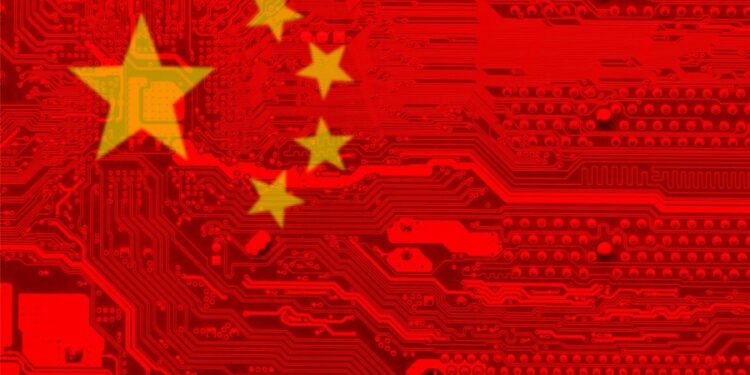
China’s DeepSeek AI has reignited fears that China might win its tech race against the U.S. It’s just the latest example of the PRC stealing our innovation to undercut America on the world markets.
When Soviet leader Nikita Kruschev said in 1956 that communist countries would “bury” capitalist ones, he didn’t mean that the USSR would inter the United States beneath the irradiated debris of its own cities. He meant something more like “We’ll outlive you” or “We’ll be there at your funeral.”
Kruschev’s words were less a threat than a projection based on existing trends. The Soviet Union had rapidly industrialized and modernized under Stalin’s brutal dictatorship. Even in the West, many believed the USSR would inevitably overtake the U.S. economically. In 1960, four years after Kruschev made his prediction, Harvard economist Abram Bergson suggested that the Soviets “will probably catch up to the United States in the 1980s.”
Today, the Chinese Communist Party is similarly confident they can outlast their geopolitical foe. This idea of civilizational competition underlies just about everything Xi Jinping does, on issues ranging from video game restrictions to foreign affairs.
According to one recent report, Xi has pursued a policy of “economic and technological ‘self-reliance’ via-á-vis the West,” including shameless intellectual property theft and protectionism for key industries. The expectation is that China can displace the U.S. as the world’s economic superpower while our cultural and political divisions tear us apart from within.
We proved the Soviets wrong. If we want to prove the Chinese communists wrong too, we’ll need to fight back on the economic front. And the race to dominate 5G technology is a decisive battle for economic supremacy in the 21st century.
By 2035, 5G is projected to enable over $13 trillion in global economic output, supporting 22 million jobs worldwide. The country that leads in 5G will have a distinct advantage in shaping the next wave of global economic growth, reaping trillions in economic benefits while setting the standards for technological development worldwide.
Unfortunately, the U.S. has fallen behind.
Huawei, China’s telecom giant, controls a staggering 30 percent of global market share in the telecommunications equipment industry. This dominance, fueled by generous government subsidies and aggressive market expansion, gives China a substantial lead in the deployment and adoption of 5G networks. For comparison, Cisco — the largest American player in the sector — holds a mere 5 percent of global market share.
It’s important to remember that the U.S. didn’t beat the Soviet Union by embracing the central planning that drove its early economic growth. We won by sticking with our system of free enterprise until Soviet socialism collapsed under its internal contradictions. In the same way, we won’t beat China by becoming China.
The solution to the growing 5G gap is not to pour taxpayer dollars into the telecom industry but to allow Huawei’s challengers to arise organically from the free market. We still have decisive advantages, but only if we unleash the full strength of our American companies.
The Department of Justice needs to remember this lesson, as they recently filed suit to block the merger between Hewlett Packard Enterprise and Juniper Networks. This merger, which received no customer complaints after a year-long investigation, will create a new American telecom capability to compete against China.
Since 2022, Huawei has been banned from exporting its products to the United States, meaning that Cisco and other American telecom companies don’t have to face the Chinese juggernaut using its non-competitive tactics on our level playing field in the domestic market. But the more our American compete with one another here at home, the more able they’ll be to compete with Huawei on the global stage. Think of it like Rocky honing his skills against Apollo Creed and Clubber Lang before facing Ivan Drago in Moscow.
For Trump’s administration officials at the Justice Department, such as Pam Bondi and Gail Slater, deals like this one should finally be allowed to move forward. But even if the deals remain bound up — whether by the Justice Department or the courts — the U.S. can still win this showdown against Huawei without Hewlett Packard Enterprise and Juniper Networks merging. There are plenty of action items that the Trump administration can undertake to better facilitate American competition against Huawei.
For example, it can facilitate partnerships between the private sector and research institutions to accelerate innovation in 5G and related technologies. By incentivizing collaboration on cutting-edge projects, whether through tax credits or research grants, the White House can foster the development of homegrown solutions that can compete with China’s state-supported model.
It can also reinforce global intellectual property protections and ensure that companies can innovate without the threat of Chinese state-sponsored IP theft. This could involve pushing for stronger enforcement of IP rights on the global stage while increasing penalties for companies (and countries) that are caught violating these standards, particularly in key tech sectors like telecommunications, where American companies are frequently victimized.
The government can and should also invest in the infrastructure needed to revive and expand domestic manufacturing of 5G-related equipment. By reducing reliance on foreign suppliers — particularly those linked to geopolitical adversaries like China — the U.S. can secure its 5G supply chain while creating high-paying manufacturing jobs at home.
While China’s lead in the 5G race is formidable, the U.S. has the tools and the talent to regain its competitive edge.
We don’t have to replicate China’s authoritarian model of growth to win. By embracing the ingenuity of American capitalism and fostering a free, competitive market, we can create an environment where U.S. companies and innovation thrive, allowing the U.S. to outlast China while preserving its position as the leader of the free world.
Rob Joyce is a cybersecurity leader with more than 34 years in the intelligence community. Previously, he served as acting homeland security adviser and special assistant to the president on the U.S. National Security Council, and as director of cybersecurity for the National Security Agency.







